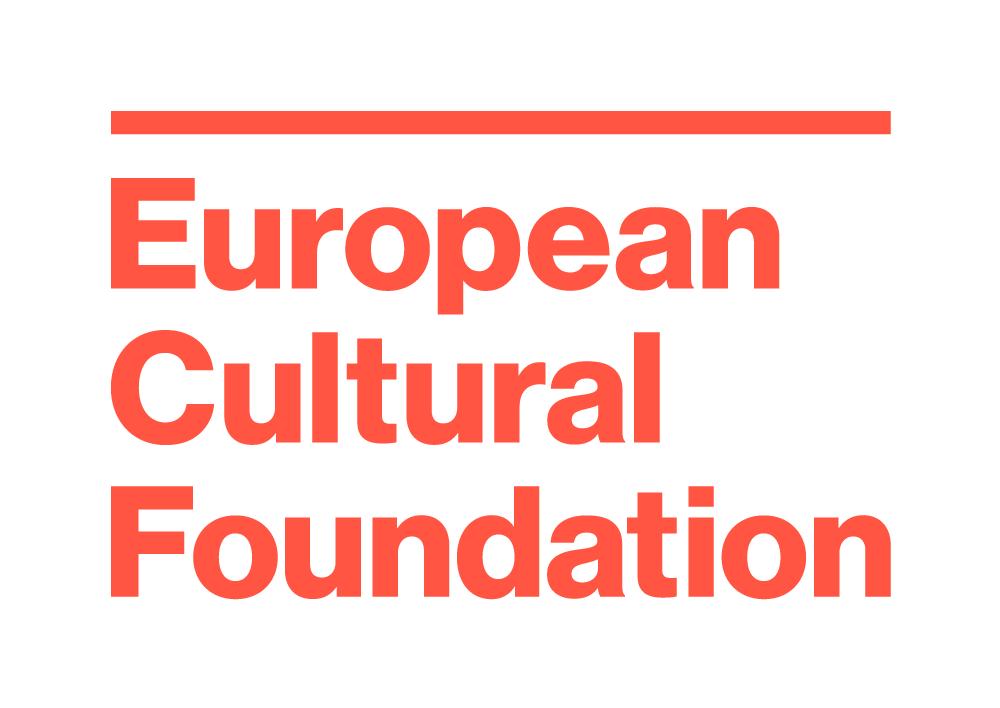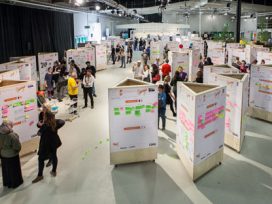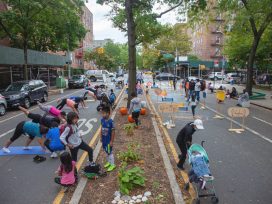Following the election of the city’s new mayor Ada Colau in June 2015, Barcelona has reinvented itself amid a hive of social, cultural and political activism. Ann Marie Utratel explains how the city’s transformation resonates with inspired efforts to realign collaborative economies with the commons paradigm.
Cities have personalities – they’re often described as we would describe people. They can be dry, manic, laid-back, iconic. Barcelona is what you might call a tonic. Always known as a vivid and creative city, Barcelona is taking the lead as an exemplary change agent on the European stage. Its DIY vigour and urgent form of citizen-level democracy are palpable, contagious and, best of all, effective.

Site and agent of change, Barcelona. Photo: Maciek Lulko. Source: Flickr
This is a city that has been reinvented by activism. A formidable woman by the name of Ada Colau, herself a long-time frontline activist for housing rights, is now the city’s mayor. As a woman, as an activist, as a mayor, she’s a good stand-in for the city itself and the radical positive changes it’s making. But that’s not to say that Ada Colau is responsible for all the whirlwind political and civic change. Barcelona is not a city in reform from the top down. It’s a city in transformation from the bottom up, and up, and up, taking on the challenges of economic and civic change from an inclusive and deliberate position, and maturing its street-level praxis into a political force that won’t be contained by its own borders. It’s ready to share its hard-won knowledge and experience with others internationally.
Barcelona is not alone in its evolution. 2016 seems to be shaping up to be a turning-point year in which the sharing and collaborative economies enter a period of intense self-examination and reinvention, and the emergence of the commons model or paradigm comes forward to effect powerful change. For example, OuiShare, an early and perhaps earnest proponent of the sharing economy from its inception, has taken “After the Gold Rush” as its OuiShareFest 2016 theme title. Clever allusions to Neil Young aside, the sentiment expressed is clear. It’s time to examine what’s left after the public image spikes and crashes of so many sharing economy darlings; time to pick up the pieces and work harder than ever to re-invent, re-purpose what remains and, perhaps most of all, re-decentralize. Everything.
As part of that process, in mid-March 2016 Barcelona was host to the “commons collaborative economies” event Procomuns, focusing on commons-oriented peer production and the collaborative economy. This event centred on producing public policy proposals and technical guidelines for building software platforms for collaborative communities, and it drew a huge and diverse crowd. Over 30 countries were represented, and almost half the attendees were women. The participants page on the event site showed an ample number of female faces, and there were families with little kids present. Procomuns was just about ideal in terms of demonstrating that it’s possible to bring together a wide range of people who normally interact online into a “real-world” setting, and accommodate some of their expectations of balanced representation, and even a few of their often overlooked real-world needs – like childcare. The outcome: 122 proposals and policy recommendations for governments ending in a joint statement of public policies for the collaborative economy, targeted toward both the Barcelona City Council and the European Commission.
This is one of several recent events that mark a growing interest in public policy. Just two weeks prior to Procomuns, for example, a policy workshop was held by Goteo, the award-winning Spanish civic crowdfunding platform. “It’s crucial that the public institutions of our time understand the importance of taking decisions together with citizen participation, and to commit to taking measures that favour inclusion, access to resources and the process of creating public policies”, remarked the platform’s strategic director, María Perulero. “Over the last five years, Goteo has built up some experience working with public institutions and other bodies willing to innovate in the decision-making, distribution and execution of financial budgets for culture. What we’ve seen is that when there’s a will to change, transformation mechanisms go to work”. Perulero and her colleague Carmen Lozano-Bright conducted the workshop together with Barcelona’s current Programa d’Actuació Municipal (Municipal Action Program), co-creating case studies in the field of culture and the economy of culture that participants wished to see included in the Municipal Action Program. The enhanced focus on civic and social empowerment and inclusion in policy-making, beyond business development, is clearly a welcome expansion in the role of the citizen. During the Procomuns event, Goteo contributed a proposal on the topic of institutional match-funding for the crowdfunding of innovative citizen-led pilot projects, an area in which its advocacy is ongoing.
Judging by the overwhelming attendance (local and international) at the Procomuns event, there is no shortage of interest on the part of citizens in these matters. Procomuns was organized around three main tracks: in addition to harvesting public policy recommendations for the urban and European commons, a further track examined the relevance of the commons-oriented model within the collaborative economy, while a third track focused on technical guidelines for free and open software and decentralized technologies. Three languages – Spanish, Catalan and English – were offered via interpreters during plenary sessions.
The objective of the event was to co-create human-centred model policies and transnational dialogue with a view to rectifying the currently fragmented nature of commons policy, as well as to give more coherent perspectives on the commons collaborative economy. Barcelona City Council representatives stressed that policies must be personal and tangible, not theoretical. The sessions on public policies for the urban and European commons strongly advocated for commons-oriented, cooperative and locally-based solutions in contrast to the prevalent private, corporate and absentee partnerships favoured by market interests. The outcome was the aforementioned series of recommendations for Barcelona’s Municipal Action Program, which will determine the policies pursued by Barcelona City Council during its four-year legislature. These recommendations will inform the European Commission’s consultation process on public policies for the promotion and regulation of the commons collaborative economy as an integral component in city and community building.
Many speakers explored the multiple faces and consequences of the “sharing economy”; the roles of social networks, entrepreneurship and worker rights in the on-demand economy; and the EU response to the climate, war and refugee crises. Political presence and influence were acknowledged as key to decentralization and democratization processes needed to achieve EU-wide innovation.
The economic track explored the relevance of the commons as a stewarding principle of a collaborative economy worthy of that name in the post-2008 context, while also emphasizing the many commons-oriented productive activities taking place in Barcelona and Catalonia. For the technology track, there were presentations on frameworks that support policy making, value creation and new economies. A thorough examination of the political and commercial interests embedded in the architectures of the technologies we use was a constant theme.
Using these three days of the Procomuns conference as the condensed expression of the astounding economic and policy innovations taking place in Barcelona and beyond, we can readily discern some emerging patterns and sketch some conclusions accordingly:
There’s no collaborative economy without commons: By simply appending the word “commons” to “collaborative economy”, the organizers of Procomuns revitalized a term which had been co-opted by commercial interests to the extent that it had lost its meaning. Conference attendees didn’t need to have the shortcomings of the Silicon Valley micro-rental industry spelled out for them. It’s understood that the “sharing economy” is a flawed model, structurally unable to disrupt the status quo or provide long-term solutions to the problems we face. The commons collaborative economy is a totally different game.
Cooperatives are the original collaborative legal structure: The cooperative framework was omnipresent at the event. Throwing around terms like “sharing” and “P2P” when describing the interactions between platform value providers and venture capitalists or shareholders is now understood to be a farce. Co-ops and not-for-profits provide more coherent market interfaces than models designed to maximize absentee profiteering. More importantly, while acknowledging its rich history, the cooperative model is understood as synonymous with innovation and real disruption.
The (sharing) revolution will be feminized: The event was attended by more than 400 people from 31 countries, with 44.53 per cent women to 55.47 per cent men in attendance – a good corrective to the perception of imbalance in the P2P and commons communities. The female-to-male ratio of speakers was similar. It was acknowledged that any political and economic revolution worthy of the name must address issues like male privilege, the often invisible care economy and feminism.
The commons collaborative ethos needs to make itself visible and coalesce: The terms “make visible” and “defragmentation” were heard throughout the conference. There was a shared consciousness of the vast potential of the commons as a more grounded economic and political framework, but also of its fragmented nature and inter-legislative shortcomings. It was generally agreed that these alternatives must be bolder, more visible and more inter-communicated.
Open source is the way to go: I was pleasantly surprised by the tone of all the tech presentations. Rather than guilting people into using free/libre or open source software, advocates made attractive and non-exclusionary arguments, while clearly describing the major pitfalls of private platforms and networks. The technical aspect also dovetailed cleanly with the political and economic tracks to form a coherent whole.
Taking the power back – and not being afraid to use it: I was simply blown away by the political savvy of the people working in Barcelona city hall. Those present at the event were fully cognizant of the failings of the current socio-economic system, along with the ongoing co-option by vested interests of (supposedly) disruptive innovations. The officials present were far more interested in listening to activists and commons advocates than tooting their own horns. Now that these 15M-seasoned city officials have taken power, they are not coy about using it to truly revolutionize the way we produce, own and govern our lives. Barcelona city hall is listening to the citizenry and ready to prioritize their needs. Barcelona leads – let’s all follow.
Published 13 May 2016
Original in English
First published by Eurozine
Contributed by European Cultural Foundation © Ann Marie Utratel / European Cultural Foundation / Eurozine
PDF/PRINTIn collaboration with
In focal points
- The city belongs to all of us
- No collaborative economy without commons
- Polish culture is turning barren
- Creating the commons in Spain: The current state of play
- Creating the commons in Moldova: The current state of play
- The power to refuse
- Culture WITH people, not just FOR people!
- When commoning strategies travel
- A rough guide to the commons
- New models of governance of culture
Newsletter
Subscribe to know what’s worth thinking about.
Related Articles

On making commons concrete
The Dutch Review of Books 2/2021
‘The Dutch Review of Books’ presents: the commons, vying for legitimacy between state and capitalism; the void of societal responsibility for #MeToo; and African oral traditions evident in rap music.

Democratic ‘Third Places’
dérive 10–12/2020
Urbanist magazine ‘dérive’ on emancipating Brazilian museology; the potential for Polish cultural centres; Swiss commons as a transferable prototype; and post-explosion Beirut.






